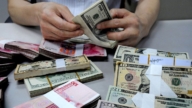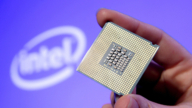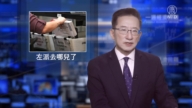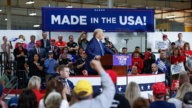【新唐人2014年05月15日讯】今年以来,人民币兑美元已跌到3%左右。5月12号,美元兑人民币中间价报,相对前一个交易日再跌44个基点,创下8个月新低。专家指出,中共央行企图控制国际汇率市场,在掌握了大量美元的同时,一直操控人民币汇率,今年,为了出口创汇,中共首先下调了人民币汇率,在外界了解到中国经济下滑厉害的真实情况后,不但出口没有得到改善,人民币也下跌不止,而为了外汇储备印制的大量钞票,却造成物价飞涨。
5月12号,美元兑人民币中间价报6.16左右,相对前一个交易日再跌44个基点,创下8个月来新的低点。
美国《彭博社》分析,中国人民币汇率连续第四个月收低,创下至少七年来的最长月度连跌走势,主要是因为投资者担心中国经济减速加剧,再加上中共央行下调人民币汇率中间价造成。
香港《南华早报》指出,如果人民币汇率上升过快,出口增长就难以达到7.5%的水平,出口收缩更不利国内就业,但如果汇率下降,人民币离国际化又渐行越远。
中国金融智库研究员巩胜利告诉《新唐人》,前些年,中共央行把人民币汇率浮动区间,控制在千分之一到三之间,现在调整到了2%左右。巩胜利说,由于出口下滑严重,央行有意下调了人民币汇率。
中国金融智库研究员巩胜利:“人民币现在遭遇了两难,贬值也没有拉动中国的出口,升值对中国企业是一个极大的打击,出口没有钱赚了,它两难最麻烦的是,人民币和其他货币的汇率不能自由平衡。它是人为的操作的。”
刚刚结束的“中国进出口商品交易会(广交会)”上,出口成交额只有316亿美元,环比下降达到10.9%。
另一方面,各路投资者看到人民币贬值已经形成一种大趋势,纷纷抛售人民币购入美元,也加速了人民币贬值。而对于国内的外贸企业来说,人民币贬值后,原来的订单就会受到损失。
正在中国访问的美国财政部长雅各布•卢,敦促中国加速汇率改革,允许“市场”因素在决定人民币汇率上发挥更大作用。
大陆金融分析师任中道:“中共操纵货币政策是害人又害己,害人呢就是,对中国民众有伤害,对贸易伙伴国家也有伤害,害己呢,它自己不断的印钱,发行货币所以把自己也给害了。”
到今年一季度,中共外汇储备达到将近4万亿美元。日前,李克强在肯亚访问时,承认大陆积聚的巨额外汇储备是沉重的负担,影响通货膨胀,给宏观经济调控也带来极大的压力。
美国《大纪元》新闻网评论指出,1978年,中共面临内外交困、经济崩溃,开始进行所谓的改革开放。中共各级政府在GDP、出口创汇、招商引资等硬指标考核下,不惜廉价出卖土地、环境、资源、人工,来追求外汇储备,并将巨额外汇储备当作大陆经济成果,进行宣传。
而这些超高的外汇储备,却导致国民财富巨额损失。世界银行2005年对中国120个城市1万2400家企业进行调查,外资企业在中国投资回报率高达22%,而中国外汇储备投资于美国国债的回报率只有3%,2008-2012年间,外汇储备累计净亏损超过7000亿美元。
而2005年人民币兑美元汇率开始允许浮动后,这种固定升值走势,又吸引大量国际热钱,和中共权贵转到海外的资金进入大陆套利,推动中国房价飞涨。
另一方面,中共为了买进美元,大量印制钞票。据大陆财经评论家“牛刀”测算,从1978年到2008年的30年中,中国内需和外贸产生的基础货币总额只有8万亿。而2008年至今,新增的2万亿美元外汇储备,就需要发行近13万亿元的人民币。
巨额货币的发行,却导致物价飙升。北京市五道口地区楼盘“华清嘉园”,从最初房价每平方米约6000元,已升高到每平方米6万元,10年涨了10倍。
采访编辑/刘惠 后制/钟元
CCP Printing Money by the Truckload to Manipulate Foreign Exchange Rate
So far this year, the Chinese Yuan had dropped
by about 3% in its value against dollar.
On May 12, the Yuan depreciated by another 44 basis points
to 6.1625 Yuan per dollar, which is the lowest in 8 months.
Experts commented that the Chinese Communist
Party (CCP)’s central banks are attempting to control
the currency market.
It keeps artificial control on exchange rates by holding
a huge amount of dollars.
To incite more exports, the CCP had been systematically
depreciating the Yuan this year.
However, after the truth about China’s economic slowdown
was known by the world, China’s exports have seen
no real improvement.
Furthermore, the Yuan just kept on dropping and prices kept
increasing in China as the CCP had printed a lot more money
for foreign currency reserves.
On May 12, the exchange rate of Yuan drops to about
6.16 per dollar, 44 basis points lower than
the previous trading day.
That was also its lowest point in 8 months.
A Bloomberg analysis said that the Yuan had been dropping
for four consecutive months,
which is the worst slip seen through a several-month span in
at least 7 years.
This mainly results from investors worry that China’s
economic slowdown will get much worse, and the CCP’s
central bank is artificially depreciating Yuan.
Hong Kong’s South China Morning Post, reported that if
the Yuan increases too fast in value,
China’s exports can hardly hit a 7.5% increase per year, which
will lead to a major market deterioration in China.
On the other hand, depreciation of the Yuan are just steps
away from globalization of the currency.
Gong Shengli, a Chinese financial think tank researcher,
told NTD that,
several years ago the CCP’s central bank had restricted
Yuan’s exchange rates floating within 0.1% and 0.3%.
Now the range has been eased to around 2%.
Gong said; as exports dropped significantly, the CCP’s
central bank artificially called for a downturn of the exchange
rates.
Gong Shengli:"Currently the CCP is facing a dilemma.
Depreciation of Yuan fails to create more exports,
and appreciation will be a huge strike at Chinese companies.
Without exports the whole state will earn much less.
The biggest trouble with the Yuan is that the Yuan’s exchange
rates are not free to balance with other currencies as it is under
artificial control."
In this year’s Canton fair, the overall export trading volume
is only $31.6 billion, which drops by 10.9% compared
to the previous year.
In addition, investors mostly agree that depreciation of
the Yuan has becomes a general trend and they are rushing
to sell Yuan for dollars,
which had further speeded up depreciation of the Yuan.
This causes direct economic loss for Chinese companies’
orders from foreign countries.
US Treasury Secretary Jacob Lew said in his visit to Beijing
that China should speed up its reform on exchange rates,
and allow the Yuan to float more freely due to market factors.
Ren Zhongdao, Chinese financial analyst:"The CCP’s control
on exchange rates is hurting both itself and others.
The policy is bad for Chinese people and its
trading partners.
It is also damaging to the regime itself because the party
printed too much money that hurts its own economy."
In the first quarter of 2014, the CCP’s foreign currency
reserves reached 4 trillion dollars.
In his recent visit to Kenya, Premier Li Keqiang admitted that
huge foreign currency reserves is a huge burden on
the CCP government,
as it may stoke inflation and greatly cast pressure on
macroeconomic control.
The Epoch Times commented that the CCP was forced to
begin the so-called “Economic Reform" in 1978,
as it faced difficulties both inside and outside the state,
especially a collapsing economy.
After that, all levels of the CCP governments seek growth in
GDP, exports and investment over everything else.
They even sell land and manpower at low prices, pollute
the environment and overuse natural resources simply to
get more foreign currency reserves.
Then the party glorifies itself via propaganda by
showing that as the CCP’s major “economic achievement".
However, huge amounts of foreign currency reserves are
causing economic loss for all Chinese.
World Bank made a survey of 12,400 companies among
120 Chinese cities in 2005,
and found that the net return of foreign companies in China
is 22%, a shockingly high ratio.
On the other hand, the return of US Treasury Securities
held by the CCP is only 3%.
China has thus suffered an economic loss of over $700
billion between 2008 and 2012.
Since Yuan-to-Dollar exchange rate began to float in 2005,
a stable appreciation of Yuan had attracted a huge amount
of hot money,
including the money transferred by the CCP bigwigs to overseas
counties, into China’s market for interests.
As a result, China’s house prices have seen a sharp
increase over several years.
On the other hand, the CCP had printed a lot of money
to purchase dollars.
Niu Dao, a Chinese financial commentator, estimated that
about 8 trillion Yuan of monetary base was necessary
to meet China’s domestic needs and foreign trade
between 1978 and 2008.
However, 13 trillion Yuan had to be printed since 2008
for additional foreign currency reserves of $2 trillion
since 2008.
Excessive money printing has caused surging prices in China.
Huaqing Jiayuan, a residential area in Beijing, had seen
an increase in house prices per square meter from 6,000 Yuan
to 60,000 Yuan, which is a tenfold rise in only 10 years.
Interview & Edit/Liu Hui Post-Production/Zhong Yuan



























